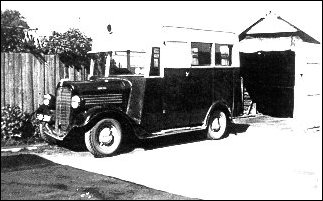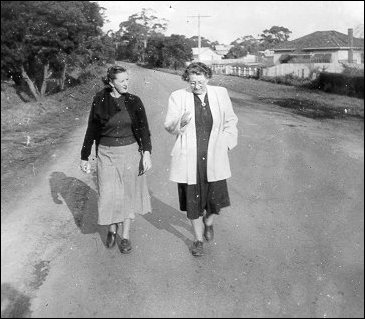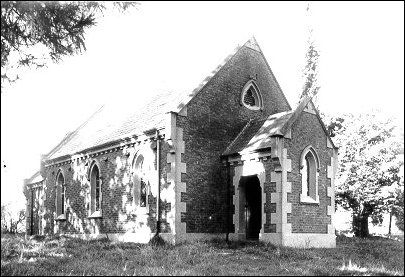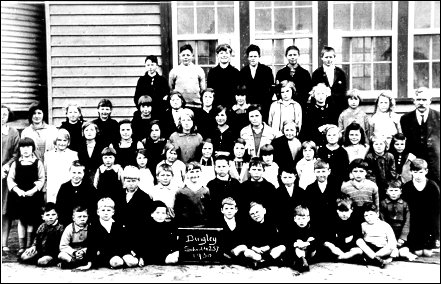Recollections of Childhood in Dingley

Dingley from Christ Church tower. c1940. Courtesy Dingley and District Historical Society.
In 1926 my family, the Gartsides, were living where the present club house of Kingswood Golf Club is situated. My brother Douglas remembers koalas being in the trees outside the backdoor also a wide range of native plants - including orchards - in the scrub at the back of the house. One of his earliest memories is of our home tennis court being covered with sawdust and lights hung so that dances could be held to make money towards the formation of the local tennis courts which were to be situated in Marcus Road. My mother and father were enthusiastic members of the founding committee of that Club. He also remembers the seven passenger Ventura Bus which travelled between Cheltenham and Dandenong, taking local children to the Dandenong High School. This service was taken over by Grenda’s and during my years at Dandenong High School the bus was driven by Jack Grigg whose father owned the small general store situated at the Five Ways intersection of Centre Dandenong Road, Lower Dandenong and Springvale Roads. Tuesday was always a busy and crowded day for the bus as people all along the route went to Dandenong to attend Market Day. We always hated it when Mr Crochrane got on because he smoked cigars.

Grenda bus Courtesy Dingley & District Historical Society.
In approximately 1937 our family home was moved across from the Golf Course site to the opposite side of Centre Dandenong Road where it remained until it was destroyed by fire in 1989. One of my earliest memories is of the day the house was moved. I remember standing at the side of the road watching proceedings when along came a woman driving a small car at what seemed to me then to be high speed. She was so busy looking at the house that she completely overlooked the fact that ropes were stretched right across her path. She was certainly pulled up with a vengeance.
As kids our family were as naughty as all others. Both Doug, Margaret and I, at various times, indulged in the old trick of placing a wrapped parcel on the road attached to a long length of string. Fortunately, there weren’t too many cars travelling along Centre Dandenong Road in those days, so not many people were duped by our tricks. (When I was attending Dingley Primary School I can remember walking to school with the Swabey and Barnett families as we strolled along spreading ourselves right across the road. It was most unusual to have to move to one side to make way for a car.) Another of our misdemeanours was to pinch vegetables from Laurie Barnett’s market garden. Doug remembers the juicy fresh carrots and I can still feel the fresh twang of the quinces that were stolen.

Kathleen walks with her mother, Nell Gartside, along Centre Dandenong Road, Dingley 1950.
Mum and Dad were very involved with sport and local community. One of my early memories is of being put down to sleep on one of the desk seats in the local school, while my parents enjoyed the dances and euchre nights. Of special memory is the smell and taste of mum’s superb scones made especially for the occasion. Suppers were a special time with the ladies of the district outdoing each other with delicious sponges, lamingtons and other delicacies. Also I remember the smell of the coffee served. I believe it was called Turban Chicory Coffee. No wonder I can’t abide coffee to this day!
The Minute Book of the Ladies Social Club, the forerunner of the School Mother’s Club, records some of the social activities in 1937, the year the club was established. Dances and euchre parties were held to raise money for local organisations. The minutes of April 19, 1938 noted that Mrs Barnett moved and Mrs Souter seconded the motion that “a euchre party & dance be held in the school on 21st May. Mrs Souter had kindly offered to make & butter scones & to give tea & coffee. Mrs Penn will make sausage rolls & Mrs Dixon to cut sandwiches. The five other lady members are asked to bring two plates of cakes, to complete the supper.” Mrs Gartside moved at the May 16, 1939 meeting “letter be written to tell Mrs Elms, our younger set are not satisfied with music & will have to try & suit them or close down.” This motion was seconded by Mrs Souter. Two other members of the club were the proposer and seconder to a motion in August 8, 1940 setting the price of admission to evening socials. “Admission to be ladies 1/-, gents 1/6. Ladies of committee to supply supper & not be charged for admission.” The Dingley Social Club continued for many, many years, meeting each week to play beetles and to raise money for the war effort.
As the war years dragged on the land at the back of the school and the Cannery was dug into air-raid shelters and we had lots of fun having drills, hiding in the tunnel areas. (Dad even dug an air-raid shelter in the front garden of our home).
The weather in my youth seemed to be hotter and colder than it ever is now. We used to walk along to school in the winter, jumping on the puddles and breaking the thick ice which had formed; in the summer we had the fun of popping the bubbles formed on the tar roads by extreme heat.
School days at Dingley State School were happy days for me. My brother and sister were both off to high school by the time I started at Dingley, however neighbours looked after me when the big adventure started. The school at that time was just two rooms divided by a concertina wall. Miss Appleby was my first teacher and life seemed to be a lot of fun. Memories flood back of practising writing between those red and blue lines, learning spelling, working out in the school gardens as a member of the Young Farmer’s Club, belonging to the Gould League of Bird Lovers, learning to knit so that we could make scarves for our soldiers overseas, having threepence to spend at Mrs Weir’s shop every so often, school sports against the always hated Heatherton State School, practising marching and of course, every Monday morning, declaring my allegiance to God, King and Country.
School picnics were a highlight of the year. During the war years we always seemed to go to Mordialloc (I suppose petrol was a problem then). We would all pile onto the back of Tom Souter and Laurie Barnett’s market garden trucks and travel the huge distance over to the beach. One of the joys on arrival was the buns and raspberry vinegar ready for us to consume. Races were always arranged and the mums were kept busy preparing lunches for us all. Great days!

Sunday School Hall at Christ Church, Dingley. Courtesy Dingley & District Historical Society.
Life revolved around Christ Church, Dingley for me. I have great memories of the Annual Tea Meetings held in the Sunday School Hall. Loads of bread spread with peanut-butter and hundreds and thousands and of course, always sickly sweet drinks of raspberry vinegar. We children used to love playing hidey in the church grounds as the parents prepared the meal. Dusk was usually falling and it was a treat to be allowed to run free at that time of day.
As I grew to be a teenager I became more involved with the choir, youth club and Sunday School. Each Christmas we would set out on our push bikes to encompass the whole of Dingley and Springvale South area, calling at homes to sing carols and being greeted either with money or huge suppers. We always made the Vicarage the first stop of the evening because we usually broke down into laughter as we started to sing and we needed some one to be the audience for our first chaotic choral performance.
The Dingley Tennis Club was the other area of entertainment. The courts at that time were asphalt and on hot days it was almost impossible to play because of the tar lifting on the courts. The tennis club ran dances once a month to make money. All age groups attended. It was nothing to have mums and dads there along with their teenage children. Can you imagine that now-a-days!
During the late 40’s milk was still delivered daily by Mr Bill Follett, who served it to his customers by means of a pint measure dipped into the big milk cans. We all had to rush out with our billys when he came along. As it turned out it was quite a community service to have these people calling on a regular basis. Bill Follett noted, one day, that the local Anglican vicar, Rev Jimmy Rowell, had not put out his milk container so when this happened the next day as well, he was forced to investigate and found that Jimmy had died. Even up to the early 1960’s I remember bread being delivered fresh to the door.
So my childhood in Dingley is looked back upon as being extremely happy, with family and friends around and lots of good things happening, including meeting my future husband.

Dingley State School 1930 Courtesy of Dingley and District Historical Society.
Back Row: Walter Wilson, Ron Gartside, Harry Souter, George Leeworthy, Wally Wright, Alf Holland.
Second Row: Miss McNamara, Miss Morris, Emily Souter, Meg Gartside, unknown, Florence Deeble, unknown, unknown, Violet Leeworthy, Myrtle Crouch, Gladys Swabey, Linda Richard, Mr Henry Jones.
Third Row: Fredo Leach, Beryl Dixon, Lila Walsh, Eileen Wright, Edna Hansen, Margaret Grant, Dulcie Atkins, Izabel Monk, Althea Wilcox, Olive Wilcox, Violet Hayes, Ruby Mitchell, Joyce Le Bon.
Fourth Row: Clara Watson Jean Lessing, unknown, unknown, Belle Waddleton, Muriel Watson, Daphne Swabey,
Kneeling: Lew Smithard, Bob Lamb, Ron Mitchell, Denny Howson, Roy Crouch, Alec Monk, Len Hallett, Jack Coughlan, Henry Monk, Keith Coughlan, Neil Booker.
Front: Bernie Monk, Doug Gartside, Alf Dixon, Cecil Collie, Bryan Yowers, Ken Gartside, unknown, Norman Booker, Stan Jenkins.
